As an HR professional working for a small business, you need to juggle various tasks like recruitment, payroll, compliance, and employee engagement, all while working with limited resources and tight budgets. The pressure to stay organized, maintain compliance with ever-changing regulations, on top of fostering a positive workplace culture can feel overwhelming, especially when relying on manual processes or outdated systems. These challenges can drain time and energy, leaving little room for strategic growth. Enter HR software for small business: a game-changing solution that automates repetitive tasks, ensures compliance, and empowers HR teams to focus on what truly matters: building a thriving workforce. In this article, we’ll explore the top HR software solutions designed to simplify your workflow and supercharge your small business’s HR game.
Key Features That Define Great HR Software for Small Business
The best HR software for small businesses helps streamline everyday tasks while remaining affordable and easy to use. It’s designed to support growing teams without overwhelming them with complexity. Key qualities to look for include:
- Ease of use – Intuitive design that's simple for non-HR professionals to navigate.
- Essential features – Includes tools like employee recordkeeping, payroll integration, benefits management, and time-off tracking.
- Affordability – Priced to fit the tight budgets of small businesses.
- Scalability – Grows with your business and adjusts to evolving HR needs.
- Cloud-based access – Enables management from anywhere, with mobile-friendly functionality.
- Strong support – Backed by responsive customer service and onboarding help.
- Automation – Reduces manual work and saves time on repetitive HR tasks.
- Compliance tools – Helps ensure you stay aligned with labor laws and reporting requirements.
Best HR Software for Small Business
Humaans

Humaans is designed to simplify core HR operations such as employee record management, onboarding, and time-off tracking. It integrates with platforms like Google and Slack, allowing HR teams to automate workflows and access workforce data efficiently.
Pricing: Humaans offers pricing plans starting from $79 per month for the Growth plan, with custom pricing for larger businesses.
HiBob

HiBob provides a platform that supports HR functions including employee engagement, performance management, and organizational development. It offers tools for managing employee data and facilitating internal communications, aiding HR leaders in fostering a cohesive work environment.
Pricing: HiBob's pricing is customized based on company size and requirements.
Omni HR
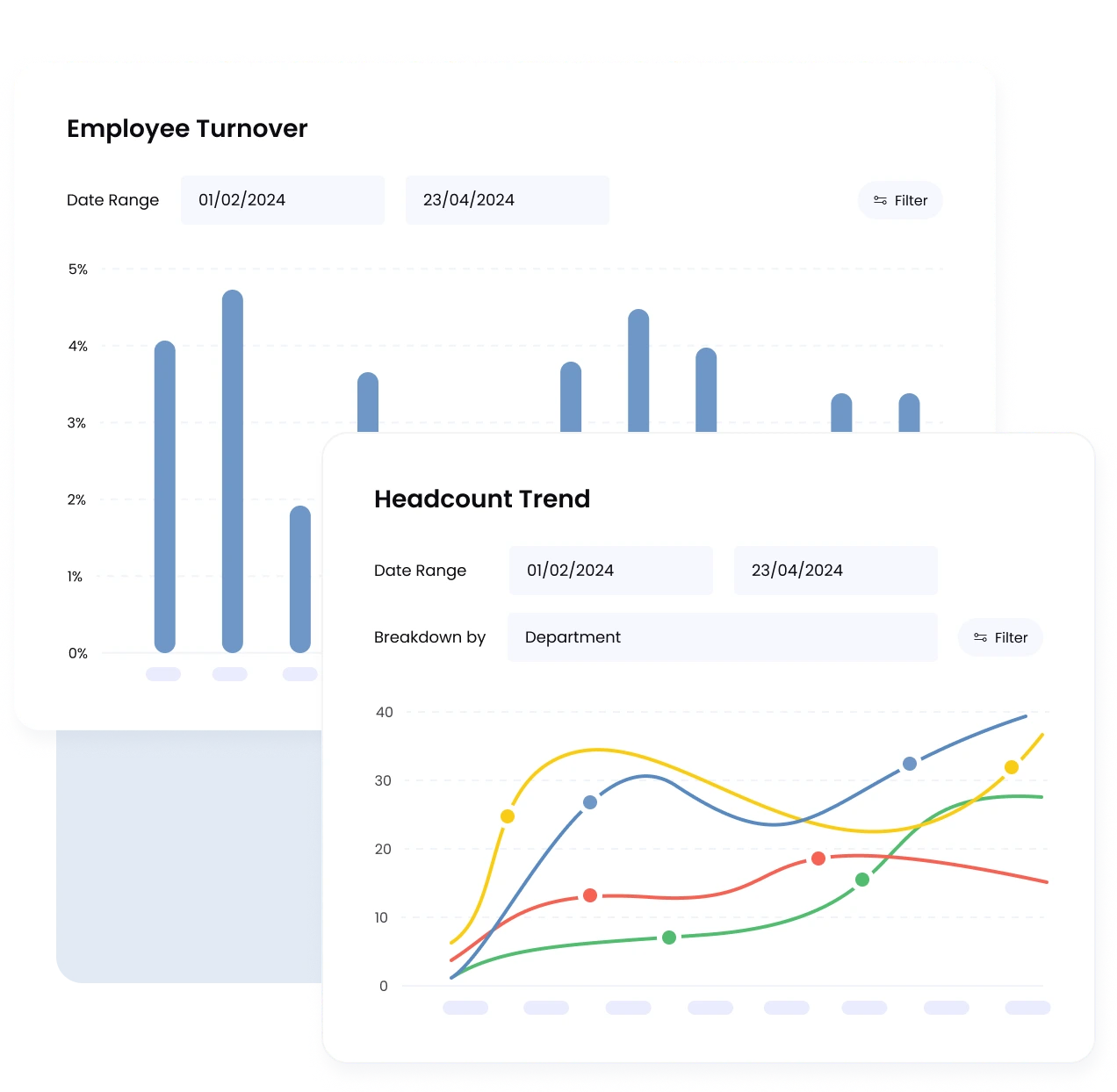
Omni HR delivers a suite of tools covering the entire employee lifecycle, from recruitment and onboarding to performance management. Its user-friendly interface allows HR professionals to automate routine tasks and focus on strategic initiatives.
Pricing: Omni HR offers a starting price of $3 per employee per month, with a 7-day free trial available.
WorkDigital

WorkDigital combines HR management, payroll, and time tracking into a single platform. It provides features such as digital contracts, shift scheduling, and compliance reporting, assisting HR teams in managing workforce operations effectively.
Pricing: WorkDigital offers HR management, payroll, and time tracking solutions, but specific pricing plans are not publicly listed.
Melioris
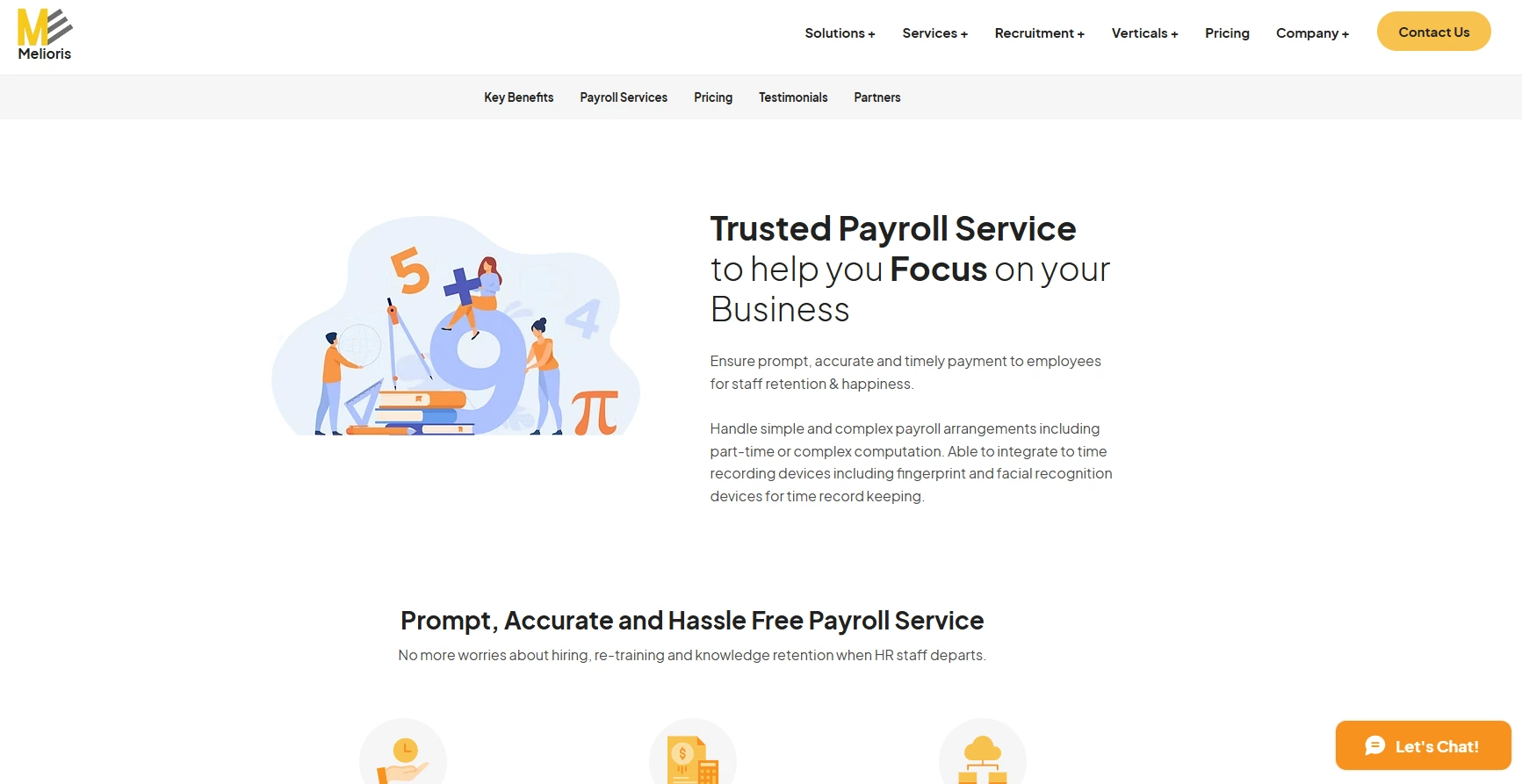
Melioris specializes in HR and payroll services, offering solutions tailored to startups and SMEs. It focuses on providing transparent pricing and scalable services to support businesses in managing their HR functions efficiently.
Pricing: Melioris offers custom pricing based on the specific needs and size of the business.
BambooHR

BambooHR is a comprehensive HR software that includes features for employee data management, onboarding, and performance tracking. It is designed to help HR leaders streamline processes and maintain organized records.
Pricing: BambooHR provides pricing based on company size and selected features, with quotes available upon request.
Sprout Solutions
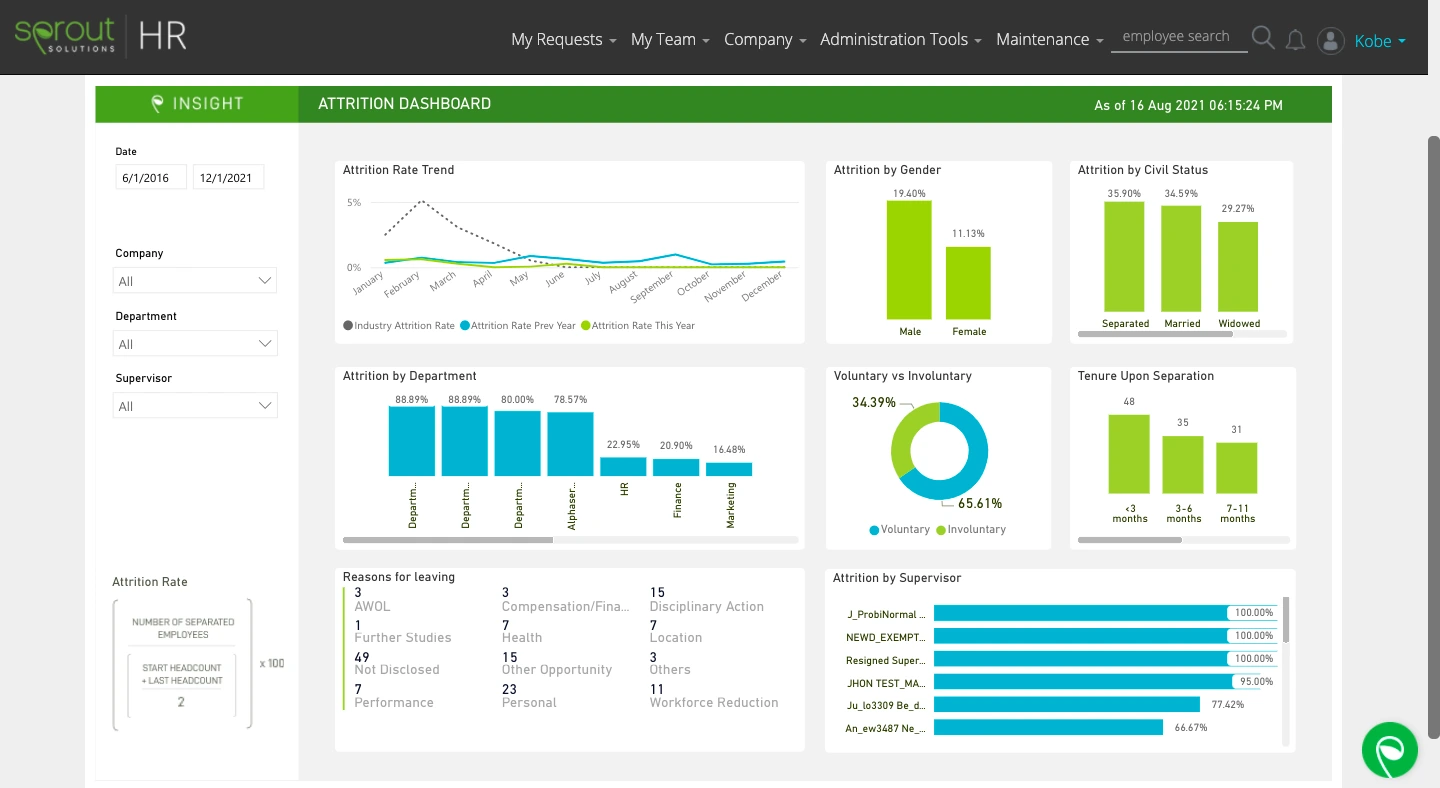
Sprout Solutions offers an integrated platform that combines HR management, payroll processing, timekeeping, and analytics. It enables HR leaders to manage employee records, automate payroll, and track attendance within a unified system, streamlining administrative tasks and ensuring compliance with local regulations.
Pricing: Sprout Solutions provides custom pricing based on specific business needs.
Integrating HR with Recruitment Software
All of the aforementioned platforms work synergetically with Manatal’s Applicant Tracking System (ATS) for recruitment. This means that HR teams and recruiters can connect their recruitment pipeline with their broader HR tools, ensuring a smooth transition from candidate selection to employee onboarding and management. This helps reduce manual data entry, maintain consistency across systems, and streamline the overall hiring workflow.
{{cta}}
Namely
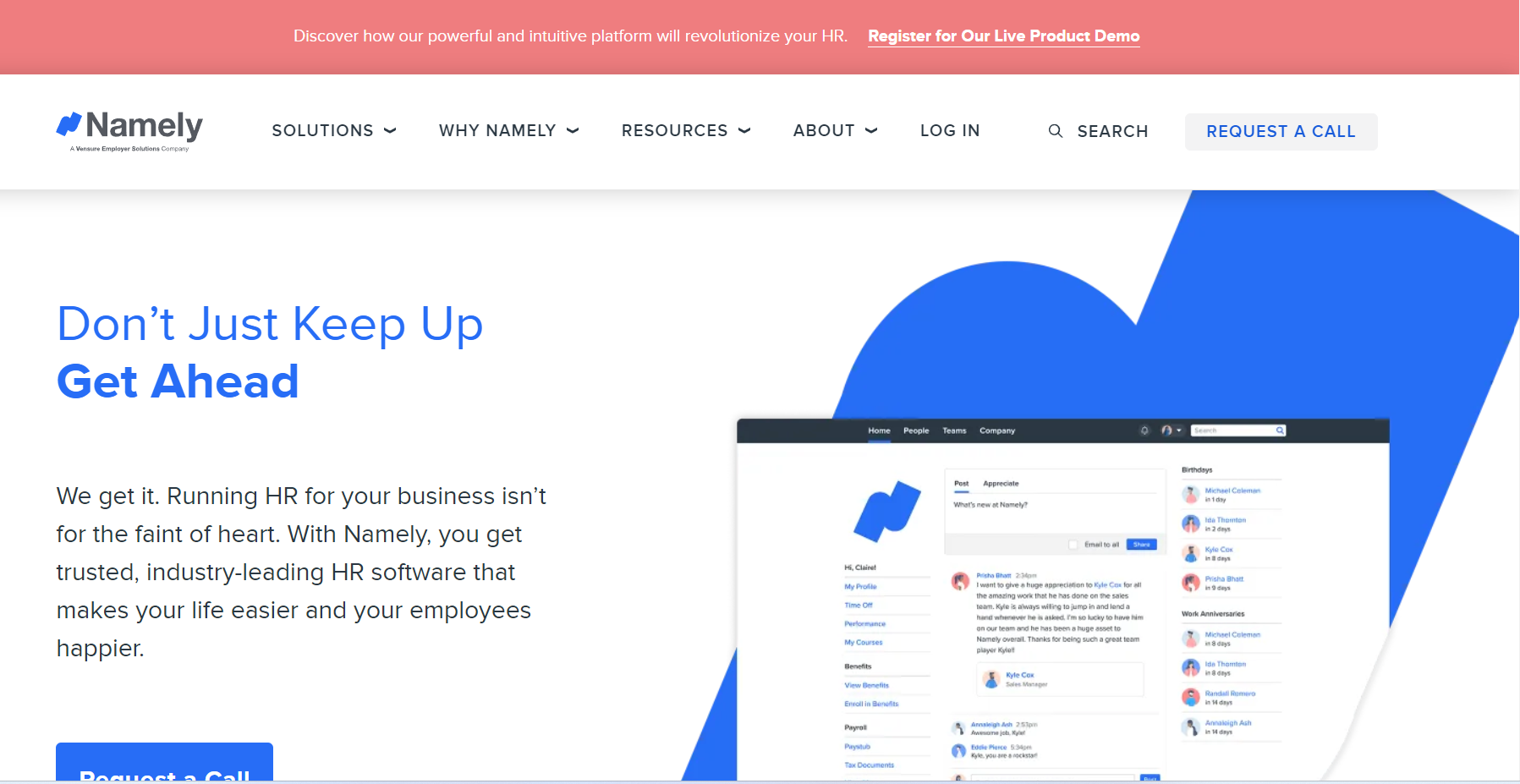
Namely is an HRIS platform that provides a wide array of features. It allows HR to easily automate or simplify tasks such as processing payroll for employees in over 190 countries, with automatic tax filing and payment, direct deposit, and pay stubs. The software can help you design, enroll, and manage employee benefits plans, with support for health insurance, retirement plans, and wellness programs.
Pricing: Namely does not publish its pricing plan on its website. However, it stated that its pricing plan starts at $9 per employee per month.
HiPeople

HiPeople is an HR software that is good for reference checking and talent assessment which helps staffing agencies and employers hire better candidates faster. The software offers unlimited reference checks, automated workflows, and integrations with popular ATS and HR software depending on the pricing plan.
Pricing:
- Free: Access to 370+ tests/ 5 users.
- Grow: $310/ month/ unlimited test and users.
- Scale: $470/ month/ unlimited test and users.
Deel
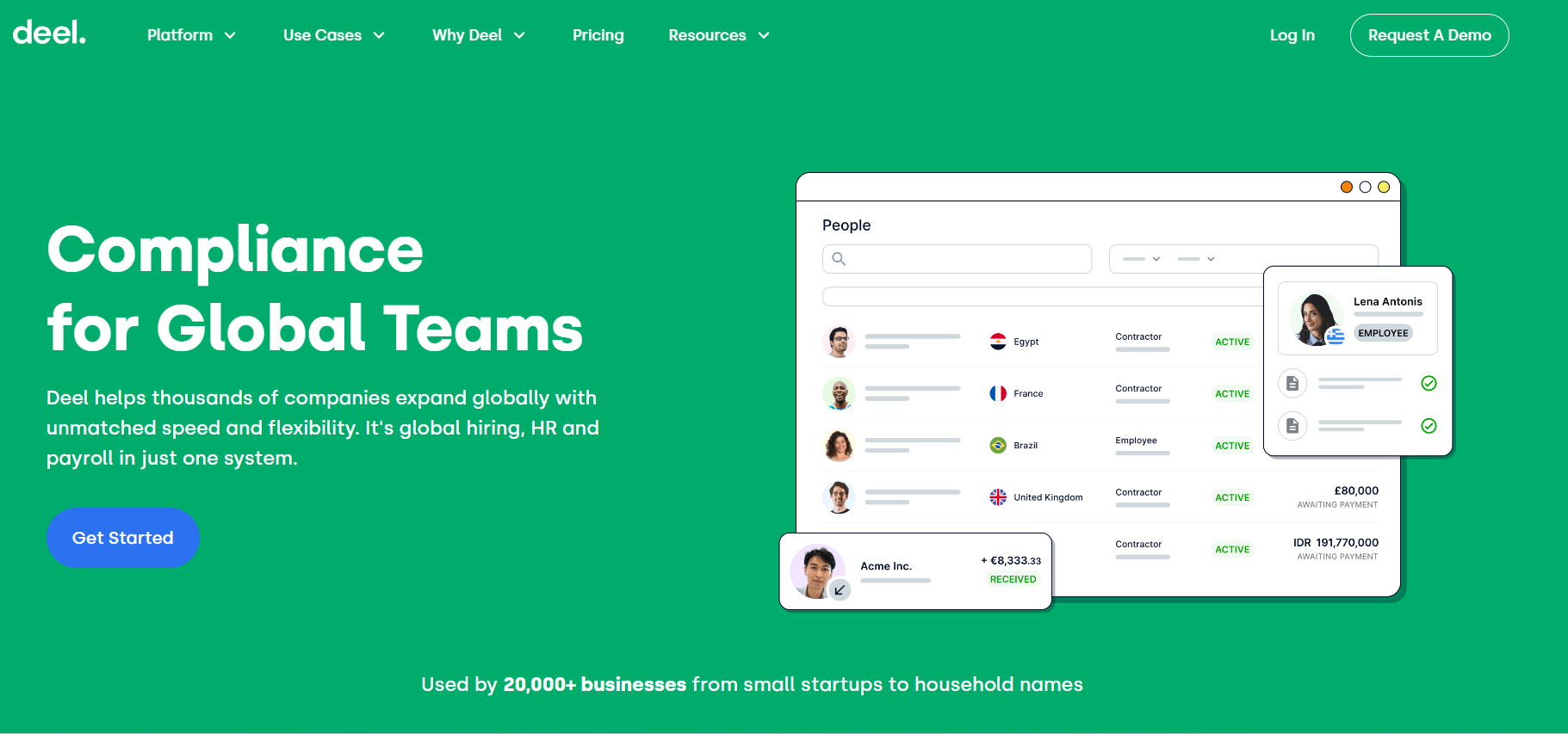
Deel is a comprehensive HR platform that supports global teams of any scale, from small businesses to large corporations. Its features allow you to hire, pay, and manage your global team (150 countries) without dealing with local regulations, complex taxes, or international payroll issues. It helps you onboard and off-board any type of worker using localized information. You can access localized information and guidance for each country to ensure compliance and avoid legal risks.
Pricing: Deel offers various plans, including Global Payroll at $29 per employee/month, Contractor Management at $49 per contractor/month, and EOR at $599 per employee/month. No free plan is available.
Connecteam
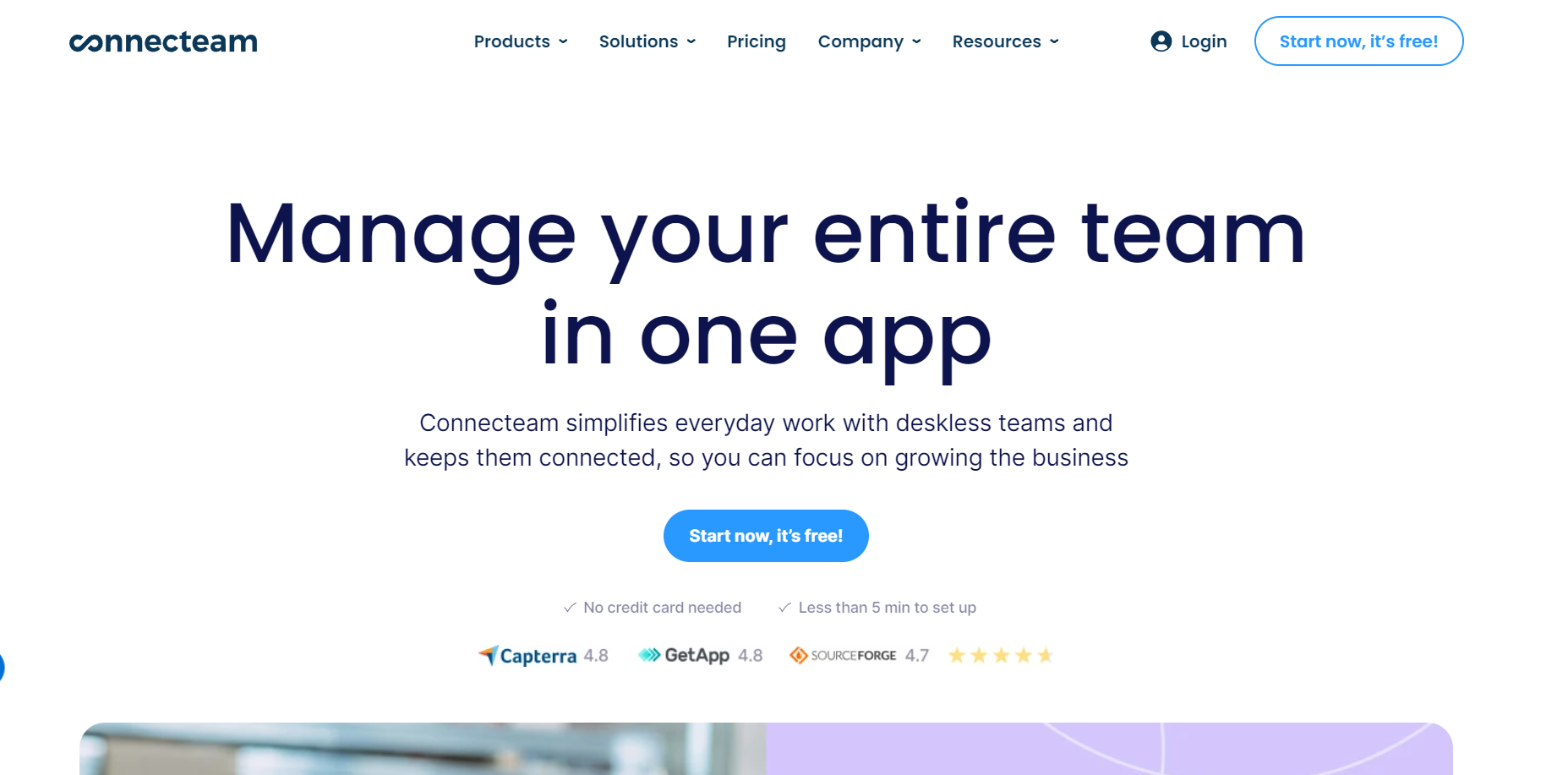
Connecteam is an HR and people management platform that is specifically tailored for hybrid or remote teams. It offers various features for communication, operations, HR, and skills development. Connecteam allows you to track and manage employee work hours, with features such as GPS location, geofencing, and overtime alerts, which helps you save time and money by reducing the work it takes to calculate employee hours. It can also help you monitor employee attendance and location, prevent time theft and buddy punching, and comply with labor law.
Pricing:
- Small Business plan: Free/ up to 10 users.
- Basic plan: $29/ month/ for the first 30 users.
- Advanced plan: $49/ month/ for the first 30 users.
- The Expert plan: $99/ month/ for up to 30 users.
Conclusion
In conclusion, when choosing HR software, whether you’re a small business owner or an HR professional working for one, you need to tailor your choices based on its simplicity and affordability, advanced sourcing and screening capabilities, seamless integrations, and transparent pricing. Other than that, you also need to ensure the providers have reliable and quality customer support with fast response times. Ultimately, investing time in evaluating and understanding these nuances is an investment in the long-term success of hiring processes, contributing to seamless workflow integration and overall business growth.
Frequently Asked Questions
Q: What are the main benefits of using HR software?
A: HR software offers key advantages by streamlining operations and enhancing decision-making. It saves time, reduces errors, and supports strategic HR initiatives through automation and data centralization.
Key benefits include:
- Automated processes like payroll, benefits administration, and attendance tracking.
- Centralized employee data for improved accuracy, accessibility, and regulatory compliance.
- Advanced analytics tools to monitor workforce trends and support strategic decisions.
- Employee self-service features that boost engagement and autonomy.
- Operational efficiency that contributes to overall business growth.
Q: How do I evaluate the payroll capabilities of different HR apps?
A: When assessing the payroll capabilities of HR apps, it’s important to ensure they align with your company’s current needs and future growth. Focus on how well the app integrates, scales, complies with regulations, and supports users.
Key factors to evaluate:
- System integration with tools like accounting and time-tracking software to streamline data flow.
- Scalability to handle increasing employee numbers and payroll complexity as your business grows.
- Compliance features to stay updated with tax laws and labor regulations.
- A user interface that is intuitive and efficient for both HR teams and employees.
- Customer support that is responsive and dependable in resolving issues quickly.
Q: How do applicant tracking and onboarding tools vary across platforms?
A: Applicant tracking and onboarding tools differ widely, so it’s essential to choose a platform that fits your HR strategy and operational needs. Consider how each tool performs across the following areas:
Key evaluation points:
- Feature set: Some tools specialize in applicant tracking (e.g., resume parsing, job posting, interview scheduling), while others offer full onboarding solutions (e.g., document collection, compliance, training).
- Usability: Interfaces range from intuitive and easy to use to more complex systems requiring specialized knowledge.
- Integration capabilities: Integration with HR systems, payroll, and third-party apps may be seamless or limited depending on the platform.
- Scalability: Some platforms are ideal for small businesses with basic needs, while others support larger organizations with more complex workflows.
Q: How user-friendly are HR platforms designed for small businesses, and what kind of training is typically required to use them effectively?
A: HR platforms designed for small businesses are generally quite user-friendly, as they are often built with the intention of simplifying complex HR tasks for users who may not have specialized HR expertise. Many of these platforms offer intuitive interfaces, streamlined features, and accessible customer support to help users navigate various human resource functions such as payroll, benefits administration, and employee management. Despite this user-friendly design, some level of training is typically recommended to use these platforms effectively. Training can range from online tutorials and webinars offered by the platform providers to dedicated sessions where businesses can learn how to customize and optimize the software for their specific needs. Additionally, providers might offer comprehensive user manuals and responsive customer service to address any questions or technical challenges that arise during use.
Q: What HR features are especially useful for startups vs established SMBs?
A: For startups, HR features that provide flexibility, scalability, and efficiency are particularly beneficial. Startups often operate in fast-paced and dynamic environments where agility is key, so having HR tools that facilitate quick hiring processes, such as applicant tracking systems and automated onboarding, can be invaluable. Performance management features that support real-time feedback and continuous goal setting can also help in building a high-performing team that is able to pivot as needed. Moreover, startups may benefit from HR software that includes compliance management and legal support to navigate the complexities of employment law without a dedicated HR team. On the other hand, established SMBs might place more emphasis on features for employee retention, such as comprehensive benefits administration, career development tools, and robust payroll systems that integrate with other business operations. While both startups and SMBs require effective HR management, the emphasis on flexibility and speed often differs according to the maturity and scaling needs of the business.





.png)






















.webp)

.webp)

.webp)
